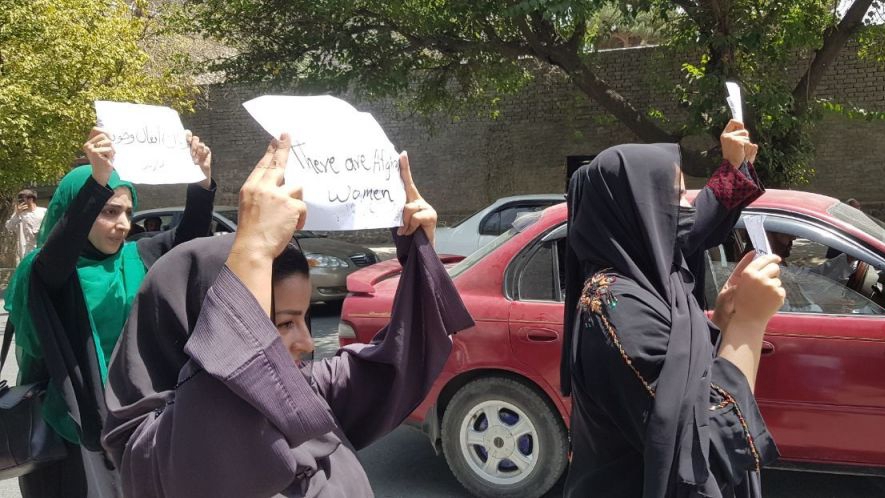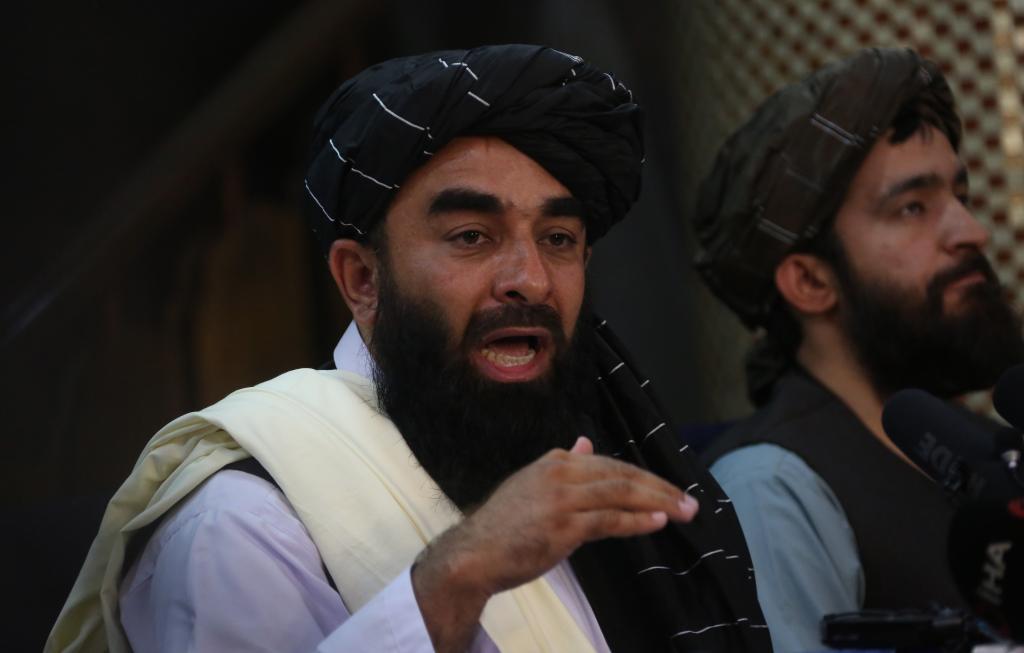
Afghan women, holding placards, gather to demand the protection of women's rights in front of the Presidential Palace in Kabul, Afghanistan, August 17, 2021. /Getty
Afghan women, holding placards, gather to demand the protection of women's rights in front of the Presidential Palace in Kabul, Afghanistan, August 17, 2021. /Getty
Editor's note: Hujjatullah Zia is a journalist and senior writer at Daily Outlook Afghanistan. The article reflects the author's opinions and not necessarily the views of CGTN.
The liberation of women shaped the narrative of the United States and NATO's counterinsurgency as former U.S. President Bush and NATO officials repeatedly made references to the violation of women's rights and liberties under the Taliban rule (1996-2001). In the post-Taliban administration, the restrictions on women's social and political roles have been abolished and the new Constitution left no room for gender discrimination.
In August 2010, 18-year-old Afghan woman Bibi Aisha, who was ruled by a Taliban commander to have her nose and ears cut off by her abusive husband, featured on the cover of Time magazine. The Time chose to accompany the picture with: "What Happens if We Leave Afghanistan," triggering contentious debate. The Time published a story with the photograph on how Afghan women embraced the liberties that emerged in the post-2001 government, and how they feared the return of the Taliban.
Nonetheless, the U.S. and its NATO allies disregarded the concerns of Afghans, mainly those of women, as they prepared for a complete withdrawal, notwithstanding the women's persistent demands for protection of their rights and liberties and the slowing down of the withdrawal.
The U.S.-Taliban peace agreement signed on February 29, 2020, in Doha, Qatar's capital, made no mention of women's rights or whether the Taliban would treat them without gender discrimination and ideological orientation and espouse their fundamental rights and freedoms based on the 2004 Constitution.
Therefore, Afghans have lost their trust in the U.S. and its NATO allies, believing that the women's rights discourse was aimed at justifying the presence of the U.S. and NATO forces in the country. According to general belief, staking women's rights and liberties after two decades of blood and treasure has been a terrible mistake.
Marginalizing its international allies and the Afghan government from the peace talks held between the Taliban leadership and the Trump administration behind closed doors in Qatar, and giving legitimacy to the Taliban, were also a U.S. political blunder.
The next mistake that ensued was the hasty withdrawal, creating a security vacuum, despite the international concerns. In a nutshell, the U.S. and NATO challenged their own narrative of women's liberation after a couple of decades, increasing women's vulnerability under "Sharia Law."
In his first press conference in Kabul, the Taliban spokesperson Zabihullah Mujahid said this about women's rights: "The issue of women is very important. The Islamic Emirate is committed to the rights of women within the framework of Sharia." He added, "The international community, if they have concerns, we would like to assure them that there's not going to be any discrimination against women, but, of course, within the frameworks that we have."

Taliban spokesman Zabihullah Mujahid (L) addresses a press conference in Kabul, capital of Afghanistan, August 17, 2021. /Xinhua
Taliban spokesman Zabihullah Mujahid (L) addresses a press conference in Kabul, capital of Afghanistan, August 17, 2021. /Xinhua
It should be noted that the U.S. and its international allies could not formulate a coherent narrative as some framed the international mission as the "war on terror." A number of regional stakeholders still fear extremist incursions and believe that although Osama bin Laden was killed, the al-Qaeda network was not eliminated. In such a case, "the war on terror" did not bear the desired result, either.
After the downfall of Afghan President Ashraf Ghani's administration, discussion is underway between Afghan officials and the Taliban leadership in Qatar for the formation of a new political order. Both Afghans and the international community fear that the civic space will shrink in the new political order and the incoming government is unlikely to be inclusive although the Taliban have so far reiterated their desire for inclusiveness.
Simultaneously, the Taliban fear being sidelined at the international level and not recognized by world powers. With this in mind, the Taliban are likely to show flexibility regarding women's rights and freedoms and seek to include Afghan officials and warlords in the next administration.
In other words, the Taliban outfit was engaged in conflict for about two decades seemingly for being marginalized since the 2001 Bonn Conference that was held on the formation of the postwar administration. As of now, they have to be considerate of this issue and try to form an inclusive government so as to avoid a backlash from former officials and warlords.
The decades-long conflict apparently for the liberation of women has proved abortive as the liberties of Afghan women are still a controversial topic in the new political system. Thousands of women like Bibi Aisha have paid a heavy price and suffered severe violence since 2001 to have their rights and liberties honored. But their expectations were not fulfilled as the U.S. and NATO states have abruptly turned their backs on them.
Afghans may wait and see how much the U.S. and its international allies would press the Taliban for the protection of women's rights and liberties and wrangle over the preservation of their social and politicals role in the next administration.
Liberating Afghan women from strict rule and ideological impositions in what the Taliban describe as an "Islamic Emirate" may substantiate the narrative of women's liberation to some extent.
(If you want to contribute and have specific expertise, please contact us at opinions@cgtn.com.)

